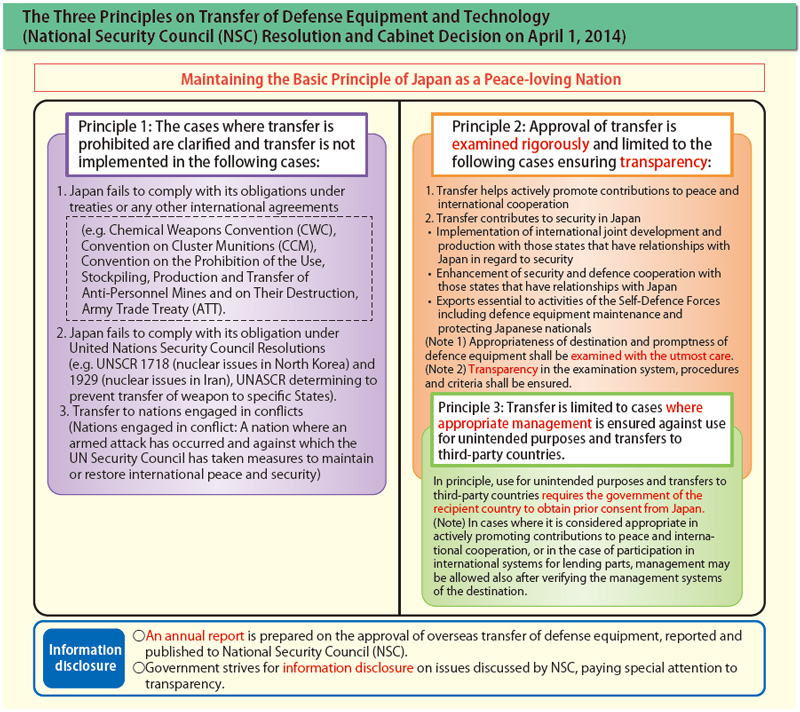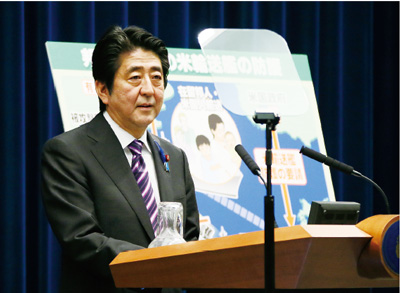Diplomatic Bluebook 2015
Chapter 3
Japan’s Foreign Policy to Promote National and Worldwide Interests
1.Security Initiatives
Since the beginning of the 21st century, the global power balance has changed dramatically and affected the global security environment in complex ways. Moreover, the proliferation of weapons of mass destruction and their delivery systems is a serious concern for both the region and the international community. In addition, new threats are emerging in the form of international terrorism and cyber attacks, while military technology is becoming more advanced.
In East Asia, the development of weapons of mass destruction including nuclear weapons by North Korea and its increased ballistic missile capabilities present a clear, imminent, and grave threat to Japan’s security. In particular, its development of ballistic missiles with ranges covering the US mainland and its attempts to miniaturize nuclear weapons for warheads and equip them to a ballistic missile substantially aggravate the threat to the security of the region, including Japan. China’s military strengthening with lack of transparency and the rapid expansion in its activities in the sea areas and airspace surrounding Japan and the South China Sea have become an issue of concern to the region and the international community including Japan: therefore, Japan needs to pay careful attention to this situation.
Thus, security environment surrounding Japan is becoming increasingly severe. Furthermore, globalization and technological innovation have given rise to a situation in which any threats, irrespective of where they originate in the world, could affect the security of Japan. In today’s world, no country can maintain its own peace and security only by itself, thereby the importance of partnerships with allies and like-minded countries and of international cooperation in securing peace and stability of the international community is increasing.
Based on this recognition on the security environment, Japan, from the policy of “Proactive Contribution to Peace” based on the principle of international cooperation, will contribute even more proactively in securing peace, stability and prosperity of the international community while achieving its own security as well as peace and stability in the region. As a major player in the international community, Japan will work closely with the US as well as other related countries to put this policy into practice, upon the foundation of the path of peace-loving nation Japan has followed.
A. Three Principles on Transfer of Defense Equipment and Technology
In April 2014, after full consideration of the role played to date by the Three Principles on Arms Exports, the Government of Japan adopted the Three Principles on Transfer of Defense Equipment and Technology as clear principles adapted to the new security environment, concerning the overseas transfer of defense equipment and technology. These new principles clearly stipulate the specific standards, procedures, and restrictions for the overseas transfer of defense equipment and technology. As well as promoting efforts to contribute to peace and international cooperation more proactively, we will endeavor to enhance Japan’s security through strengthening of security and defense cooperation with other countries in accordance with these principles.

B. Development of Security Legislation
Amid the changing security environment surrounding Japan, maintaining the peace and security of Japan and ensuring its survival as well as securing its people’s lives and peaceful livelihood are the primary responsibility of the Government of Japan. Japan cannot prosper without a peaceful and stable international environment, so our nation must contribute even more proactively to the peace and stability of the international community, under the policy of “Proactive Contribution to Peace” based on the principle of international cooperation. To put this into practice, we must develop domestic legislation that enables seamless responses to any situations. Based on this understanding, the ruling coalition undertook several rounds of meeting following the May 2014 submission of the report by the Advisory Panel on Reconstruction of the Legal Basis for Security, and in July, the Government made the Cabinet Decision on Development of Seamless Security Legislation to Ensure Japan’s Survival and Protect its People. Upon this decision, the Government has commenced the tasks of drafting legislation bills necessary to secure the lives and peaceful livelihood of its people.
The Government has explained this Cabinet decision to the relevant countries with transparency. The Cabinet Decision has been welcomed and supported by many countries worldwide, including those in Asia and Oceania, Europe, North and South America, and the Middle East. The Government will continue to take all opportunities to explain Japan’s security policy to other countries.
(General Outline of the Cabinet Decision)
- 1. Response to an Infringement that Does Not Amount to an Armed Attack
- (1) The Government will further strengthen the necessary measures in all areas, which include enhancing the response capabilities of relevant agencies such as the police and the Japan Coast Guard, and strengthening collaboration among the agencies, accelerating procedures to issue orders.
- (2) To enable the SDF and the US military to respond seamlessly in close cooperation, the Government will develop legislation that enables the SDF to carry out “use of weapons” to the minimum extent necessary to protect weapons and other equipment of the units of the United States armed forces if they are, in cooperation with the SDF, currently engaged in activities which contribute to the defense of Japan.
- 2. Further Contributions to the Peace and Stability of the International Community
- (1) The Government will proceed with developing a legislation which enables necessary support activities to armed forces of foreign countries at a place which is not “the scene where combat activities are actually being conducted”, based on the recognition that Japan’s support activities conducted at a place which is not “the scene where combat activities are actually being conducted” by a foreign country are not regarded as “Ittaika with the Use of Force” (forming an “integral part” of the use of force).
- (2) The Government will proceed with developing a legislation that allows the use of weapons associated with the so-called “kaketsuke-keigo” (coming to the aid of a geographically distant unit or personnel under attack) and the “use of weapons for the purpose of execution of missions” in activities including peacekeeping operations as well as police-like activities that do not invoke “use of force,” including the rescuing of Japanese nationals with a consent from the territorial state, by ensuring that such activities can be carried out without giving rise to any constitutional problems.
- 3. Measures for Self-Defense Permitted under Article 9 of the Constitution
The Government has reached the conclusion that- (1) a. not only when an armed attack against Japan occurs but also when an armed attack against a foreign country that is in a close relationship with Japan occurs and as a result threatens Japan’s survival and poses a clear danger to fundamentally overturn people’s right to life, liberty and pursuit of happiness,
- b. and when there is no other appropriate means available to repel the attack and ensure Japan’s survival and protect its people, use of force to the minimum extent necessary
- c. should be interpreted to be permitted under the Constitution as measures for self-defense in accordance with the basic logic of the Government’s view to date.
- (2) In certain situations, this “use of force” is, under international law, based on the right of collective self-defense, but it is permitted under the Constitution only when they are taken as measures for self-defense which are inevitable for ensuring Japan’s survival and protecting its people; in other words, for defending Japan.
 Prime Minister Abe gives a press conference following the approval of the Cabinet Decision on the Development of Seamless Security Legislation (July 1, Tokyo; Source: Cabinet Public Relations Office)
Prime Minister Abe gives a press conference following the approval of the Cabinet Decision on the Development of Seamless Security Legislation (July 1, Tokyo; Source: Cabinet Public Relations Office)
C. Territorial Integrity
Maintaining territorial integrity is a fundamental responsibility of a state, and Japan’s policy of resolutely protecting its land, sea and airspace remains unchanged. Therefore, Japan will continue to respond firmly but in a calm manner. At the same time, the Government of Japan is engaged in proactive efforts to enhance its ability to promote awareness of Japan’s territorial integrity among other countries, making use of the contacts and knowledge of our diplomatic missions overseas.
